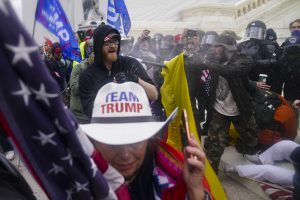On January 7, Chinese Foreign Ministry spokesperson Hua Chunying tweeted, without comment, a 2019 video entitled “Mobs storm Hong Kong’s Legislative Council.” The video shows black-clad, umbrella-wielding groups breaking glass doors to storm into Hong Kong’s legislative building, where they defaced the Hong Kong government seal and committed other acts of vandalism. The event occurred on July 1, 2019, during the height of Hong Kong’s anti-extradition bill protests
From her tweet alone, it wasn’t immediately apparent why Hua was bringing up events from a year and a half ago. But given the context, it’s safe to assume Hua was drawing an unspoken parallel between the break-in to LegCo in 2019 and the storming of the U.S. Capitol Building on January 6, 2021. A pro-Trump protest, after hearing from President Donald Trump himself, turned into a violent mob, forcing their way into the Capitol in an attempt to prevent Congress from giving its ceremonial approval to President-elect Joe Biden’s victory in the 2020 election.
Hua’s comments in the January 7 press briefing made the Hong Kong-DC parallel explicit. Prompted by a question from a reporter asking for her thoughts on the comparison, Hua didn’t hold back:
You mentioned the unrest in Hong Kong. On July 2019, radical and violent protesters in Hong Kong broke into the Legislative Council, ransacking the main chamber, smashing facilities, tossing toxic liquid and powder at police officers, and even biting off one police officer’s finger and stabbing another. But the Hong Kong police showed maximum restraint and professionalism and no protester ended in death. You mentioned that there were already four deaths in Washington in what was less violent and destructive than the case in Hong Kong.
If you still remember how some U.S. officials, lawmakers and media described what’s happened in Hong Kong, you can compare that with the words they’ve used to describe the scenes in Capitol Hill. I made a note of some words they used. They all condemned it as “a violent incident” and the people involved as “rioters”, “extremists” and “thugs” who brought “disgrace.” Now compare that with what the Hong Kong violent protesters were called, like “a beautiful sight” [a reference to a comment by House Speaker Nancy Pelosi] you brought up and “democratic heroes.” They said that “American people stand with them.”
What’s the reason for such a stark difference in the choice of words? Everyone needs to seriously think about it and do some soul-searching on the reason.
My colleague Abhijnan Rej, in his trenchant analysis of the storming of the Capitol, wrote that “Every time the U.S. would seek to bring a Xi or Duterte or Bolsonaro into line, strongmen will retort with descriptions of how Trump’s militia literally brought American lawmakers to their knees as they sought to uphold the people’s will.” That’s true, but Hua’s comments reveal another, equally troubling dynamic at play as well: The Chinese Communist Party (and other authoritarian governments the world over) can point to the clearing of the U.S. Capitol – by police as well as the National Guard, with four fatalities reported – to justify their own treatment of protesters.
There’s no small irony in the fact that, also on January 6, Hong Kong arrested 53 pro-democracy politicians and activists for “subversion,” alleging a plan “to paralyze the government and seriously interfere in, disrupt and undermine the performance of government duties and functions, and compel the Central People’s Government [in Beijing] and the HKSAR [Hong Kong Special Administrative Region] Government.” Those arrested in Hong Kong had committed the supposed crime of contesting an election, with a plan to win a legislative majority and blueprint for how to use that power. The mob at the U.S. Capitol, meanwhile, showed what subversion with the intent “to paralyze the government” actually looks like by using violence to forcefully adjourn the U.S. Congress to prevent it from carrying out official duties.
If U.S. media, rightfully, is refusing to legitimize the mob of January 6, 2021 as “protesters,” then Hua and other will claim the right to label dissenters at home “insurrectionists.”
In separate comments, Hua suggested that the chaos at the U.S. Capitol on January 6 would help China, both abroad and at home.
On the foreign policy front, China seems intent on using the violence – which has cast an indelible stain on the U.S. as a whole, but particularly on Trump and his close allies – to discredit the Trump administration’s China policy. That includes Beijing’s personal bete noire, Secretary of State Mike Pompeo, who has been particularly bombastic in his criticisms of China, even as the clock ticks down on his tenure.
“A handful of anti-China politicians in the #US have been staging a final show of madness,” she said on Twitter. “They’ll stop at nothing to sabotage China-US relations for selfish gains. Such acts will surely be punished by history. The #US shall pay a heavy price for its wrong actions.” The violence at the Capitol thus becomes delegitimizing for the Trump administration’s China policy, as the same actors are responsible for both.
Hua also suggests, as many analysts expected Chinese officials would, that the chaos is more evidence that democracy is inherently messy and unstable – and thus that China’s authoritarian system is preferable. If and when Chinese people seek a voice in politics, CCP officials can point to the events of January 6 in the U.S. to justify keeping tight control.
“Thank you, Mr. #Pompeo, for this vivid lesson,” Hua added to her Twitter thread. “Thanks to it, we #Chinese cherish our life & love our country even more. We are also more convinced that the path we’ve chosen is correct.”

































